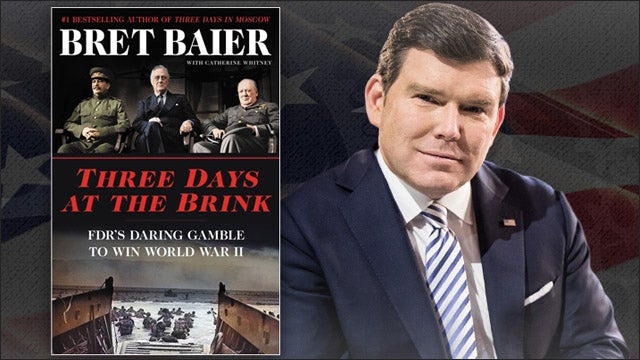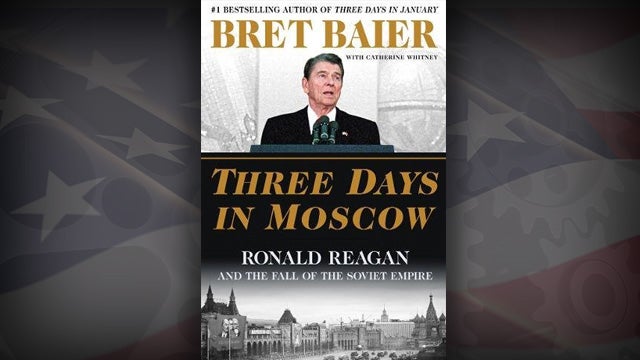RUSH: Bret Baier is back, chief political anchor, Fox News Channel, the host of Special Report with Bret Baier at 6 p.m. And he’s back, folks, with the third book in his Three Days presidential series, Three Days at the Brink: FDR’s Daring Gamble to Win World War II. Welcome back, sir. Great to have you again.
BAIER: Rush, thanks for having me.
RUSH: So, Bret, these are serious books. I want to ask you what you’re doing here, why you’re writing — I mean, you’re not doing a memoir yet. You’re not writing a current affairs book. These are serious, weighty, historical books with a unique take that you’re attaching. The first one was the Ike book, Three Days in January, then the Reagan book was Three Days in Moscow, now Three Days at the Brink: FDR’s Daring Gamble. I’m sure you’ve got not much spare time. These are serious endeavors. What’s the objective here?
BAIER: Well, you know, Rush, first of all, I write at night after a long day, and it’s something that I’ve just come to love, finding these historical nuggets, focusing on a moment in history, like through a soda straw, and then bouncing back and looking at how these leaders get to this point. Eisenhower was the final three days and the farewell address. Moscow and Reagan was the three days of the Moscow summit between Mikhail Gorbachev and President Reagan and bouncing back, how he gets there.
Three Days at the Brink is about what is largely overlooked in history, the Tehran Conference in November of 1943, at the brink because the Allies could literally lose World War II. Hitler’s on in March in Europe, Japan’s having some success in the Pacific. FDR, Churchill get together decide they need a face-to-face meeting with Joseph Stalin, and they set out to have this conference. It’s in Tehran, Iran, and eventually through this conference they plan D-Day, Operation Overlord, and obviously that changes the course of history.
RUSH: And it’s, as you say, I mean, this is technically the beginning of the Cold War because after this they already had agreed to sort of divide the world up after this victory had it gone that way, correct?
BAIER: Yes. And it’s a complex thing. They want to win the war. They need Stalin on their side. They know he’s a brutal authoritarian dictator, he’s killed millions of his own people, but they need to court him in order to beat Hitler. And the concessions given by FDR — Churchill’s far more skeptical of Stalin — but the concessions given lay the groundwork for what Stalin does later and taking over Poland and much of Eastern Europe and the start of the Cold War. And I think that, you know, we forgot a lot of our own history. And that’s why I love these books, is to be able to focus in, especially for kids, who largely are forgetting history.
RUSH: Yeah, you know, that’s so important. And I don’t mean this as an artificial compliment or any kind of sucking up, but to do what you do, to excel, for anybody to excel in journalism you have to have a knowledge of history. And I’m just worried it’s not being taught sufficiently to everybody. If you look at modern-day history textbooks for high schools, you’ll be stunned at where they begin. Abraham Lincoln gets one paragraph.
But you couldn’t do your job as effectively as you do without having historical perspective to understand current events as they relate to past. And how much have you learned in writing these books — this is the last generic question — how much have you learned in these books that you didn’t know throughout your normal history education up through college?
BAIER: A ton. A ton of these nuggets that paint a picture, that put people like a fly on the wall in these situations. For example, it’s been out there, but I didn’t know that FDR has to get over to Tehran, so he gets on his presidential yacht, the Potomac, and meets the USS Iowa, one of the new naval [battleships]. You know, he’s in a wheelchair. They elevate him on to the [battleship], and they start out in U-boat infested waters, they are surrounded by other battleships.
One of them, the William S. Porter, is doing an exercise to show the president, you know, what’s happening and how great they are. They have a torpedo tube that accidentally has a firing mechanism in it, it fires a torpedo at the USS Iowa with the 32nd president and the entire Joint Chiefs of Staff. The captain moves the boat towards the torpedo, it barely misses the bow and explodes a thousand feet away. If that had taken down that ship, we would not have FDR or all his Joint Chiefs of Staff.
RUSH: You could have titled this Three Days at the Torpedo.
BAIER: (laughing) I mean, those nuggets, I didn’t know that and I think a lot of people looking back at history —
RUSH: Well, you know, FDR, FDR is a polarizing figure. I remember growing up I was from, am from a family which did not have a high opinion of FDR, but a lot of people in our town did. FDR arguably the man who, creating the welfare state, then empowering the Democrat Party to stay in power in perpetuity. Others look at him as not just that, but the architect of victory in World War II and even maybe using some manipulation to get public opinion behind it. What was most surprising to you about FDR that you learned that you didn’t know?
BAIER: Well, first of all, he’s complex. And I think in all of these leaders you look at them, we look back in time, we look at them as superhuman. You know, FDR is the picture of the jaunty pose in the convertible with the cigarette, and he had many, you know, positive qualities — optimism, self-confidence, this communication ability. But he also had major flaws. He was egotistical and stubborn and had a god complex at the end.
He’d been elected four times and he believed he alone could lead America in the right direction, which is what leads, Rush, to some of the concessions he gives to Stalin, first to Tehran and then at Yalta that empower Stalin. FDR believes that he can steer Stalin, corral him, contain him, but after Yalta FDR goes back to the U.S. and dies thereafter, and Stalin then goes on to take over Eastern Europe eventually and that starts the Cold War.
RUSH: We are talking with Bret Baier, author of the last in the Three Days historical series, Three Days at the Brink: FDR’s Daring Gamble to Win World War II. Did he ever see the light about Stalin before he died, or did he remain of a single frame of mind about him?
BAIER: He knew he was a bad person and he believed that that he had to make the deals he had. Churchill was always telling him, you know, be careful. It was almost the Reagan message of trust but verify. Churchill eventually says to FDR no one has been a more consistent opponent of communism in the last 25 years than me, but if Hitler invaded the gates of hell, I would at least make a favorable reference to the devil in the House of Commons. So they knew they had to hold the hands of the devil in order to win the war, but they lost the peace.
RUSH: I think a lot of people are gonna be surprised. You mentioned Yalta. And most people think that was the meeting between Stalin and FDR and Churchill. I think you’re gonna find a lot of people had no idea there was a Tehran meeting.
BAIER: And it was such a crucial part in the war. The fact that Stalin chooses Tehran, and he holds the line, says I’m not gonna meet anyplace else, he holds the cards. So FDR makes a 6,000 mile journey to get there. Yalta’s even further. The Tehran journey really hits FDR as far as his health. Yalta essentially kills him.
RUSH: Now, did you have any preconceived notions, like we all do about FDR, before you wrote the book, anything that changed in your perception of him?
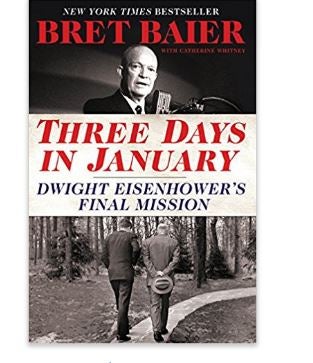 BAIER: I did, just thinking back to all that he did — and you mentioned all of the programs and the setting that up and how he’s a lifting figure for the progressive left. But what I did learn was how his polio, at age 39, really changed him. He became much more empathetic, much more ability — ability to reach out and talk to people. And I think that that, if you look back at leaders, there is always one crucible that they have to get through. For Eisenhower, he came from a really poor family in Abilene, Kansas. For Reagan he dealt with a poor family, but also an alcoholic family. So that was Roosevelt’s crucible even though he was very wealthy —
BAIER: I did, just thinking back to all that he did — and you mentioned all of the programs and the setting that up and how he’s a lifting figure for the progressive left. But what I did learn was how his polio, at age 39, really changed him. He became much more empathetic, much more ability — ability to reach out and talk to people. And I think that that, if you look back at leaders, there is always one crucible that they have to get through. For Eisenhower, he came from a really poor family in Abilene, Kansas. For Reagan he dealt with a poor family, but also an alcoholic family. So that was Roosevelt’s crucible even though he was very wealthy —
RUSH: Well, the media is also different. It’s impossible today that a presidential candidate could be in a wheelchair and the press cover it up. That just would not happen. Or would it?
BAIER: No way. No. You know, I mean, he had a complicit — on that front they never showed a picture of FDR in a wheelchair. He did have his outreach to America through his fireside chats which was I guess his Twitter. He also had the bad history about trying to control the press. Mark Levin goes into that in his book. But he was a complex figure but a major figure for the U.S., and I think looking back, could help us — you know, we go in circles here. Sometimes we deal with the same things.
RUSH: We take a break here. Bret Baier again with us. Three Days at the Brink. It’s out tomorrow. Preorders, of course, are available now. The title, Three Days at the Brink: FDR’s Daring Gamble to Win World War II.
BREAK TRANSCRIPT
RUSH: Bret Baier is back with another Three Days at the Brink: FDR’s Daring Gamble to Win World War II. Bret, I once asked Henry Kissinger about his negotiations with the Vietcong in Paris. He was noted for his intelligence and his toughness and so forth. I asked him if he found it challenging. “Were they up to speed with you, Dr. Kissinger? Were you able to talk to them on the same level? Did you have to make compromises?”
In that light, was Churchill somebody who impressed FDR? These guys are at the pinnacle of their lives and careers. Did they have a mutual respect for each other’s greatness, and did they have an awareness of their presence of the moment and the importance of what they were doing, or was it just another day at the office for them?
BAIER: No. They had a really close relationship. You know, Churchill tries for a long time to get FDR and the U.S. to help Great Britain. They’re essentially fighting the Nazis by themselves in the Battle of London and others. Obviously when Pearl Harbor happens, the U.S. gets into the war, but the relationship had long been established. In the winter of 1941 Churchill comes to the White House, they talk late into the night, not only about the war but also about the postwar, and they’re talking about an organization of countries that will be allied against fascism.
They go to bed and FDR has an idea, he rolls down the hall, bursts into Churchill’s room and says, “I’ve got it, Winston, I’ve got it! We’ll call it the United Nations.” And Churchill has just taken a shower, he comes out of the shower stark naked and FDR says, “Oh, I’m so sorry, I’m so sorry,” apologized profusely. And Churchill doesn’t move and he’s standing there towelless, and he says, “The prime minister of Great Britain has nothing to keep from the president of the United States.”
RUSH: (laughing).
BAIER: So they had a really close relationship and one where, when FDR dies, Churchill doesn’t go to the state funeral, but he comes to Hyde Park, which is, by the way, where I am right now. I just launched the book at the FDR library. And he comes to the grave, and he sits there for a long time. And I think you look at that image, and you think, he believed, Churchill believed, that FDR was the only one who was his equal.
RUSH: Well, I often wonder about this. You know, when I was younger and aspiring to my own goals, I thought the people that I wanted to be were secure, never had any doubts, were fully, fully cognizant of themselves. And I found out everybody’s insecure, everybody has their own weaknesses, everybody’s got self-doubts now and then. And these were seminal moments that these three people were involved in. We got the world carved up after World War II, which, as you say, led to the Cold War. I mean, we did beat Hitler, but look what some would say was the price for it. And I just wonder, was this understood? Did they know what they were giving Russia, i.e., the Soviet Union, when they cut these deals at Yalta?
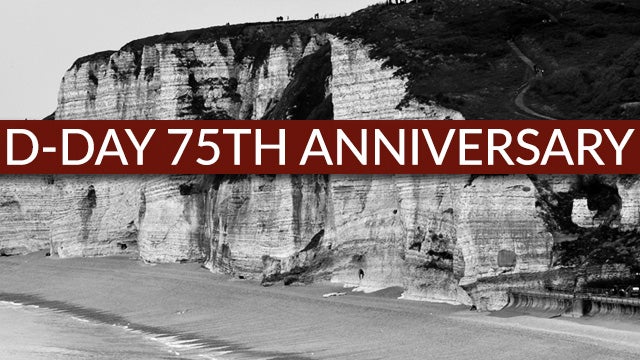
BAIER: I think Churchill understood it more than FDR. Maybe FDR understood it, but he believed that the real issue at hand was beating Hitler. And in that case, he’s right. I mean, there is, and we forget, there is a real chance that the allies could lose World War II. If D-Day doesn’t happen, if it’s not planned, if it doesn’t go off well, we could all be speaking German. That’s not a joke. It was real.
RUSH: Yeah. The Man in the High Castle. Right.
BAIER: Yeah. So I think that FDR was the more urgent, and Churchill saw the dangers ahead, and he articulated them many times —
RUSH: Do you have a couple minutes for some questions about present day Washington?
BAIER: Of course.
RUSH: ‘Cause we got about five minutes here and I need to pick your brain. What is your perception — you’re in town — where’s this impeachment heading? Schiff’s doing everything in private, behind closed doors, leaking what he wants to leak. It’s at variance with what the transcripts ultimately prove. I have my own theory about what’s happening here, but what is yours?
BAIER: Yeah. I listen to you all the time, and I think you’ve got your hand on the pulse because, you talk about history, you know, there’s obviously history and the decision to not have a vote to initiate this impeachment inquiry. And they can do it, obviously, and they can do all of these things behind closed doors, but it seems like the politics of not having moderate Democrats from Trump districts vote early on was the impetus for this. Now, it may turn out that they make articles of impeachment, they can convince all of these Democrats to vote and thereby get impeached in the House, but it’s tough to imagine that 19 Republicans in the Senate in a trial are going to sway based on what we’ve seen so far.
RUSH: Yeah, but they don’t need that. I don’t think they went to go to an acquittal. I think they just want to say they got a bipartisan — if they can pick off Romney and a couple Republicans in the Senate, that’s it, that’s gold to them, then they can run around and the media can say “bipartisan coalition has agreed that Trump should go.”
BAIER: Right.
RUSH: And that’s the campaign for 2020.
BAIER: Right. And which is the ultimate goal, so you get the impeachment but then the campaign is the ultimate effort to kick him out. I think in the dual track — and we’ve been reporting a lot about the IG report that’s expected really any day, definitely before the end of the month, Horowitz, the Durham report that we first reported was expanded because of what they’re finding. You have these dual tracks that are happening, and it’s kind of a race to the finish line.
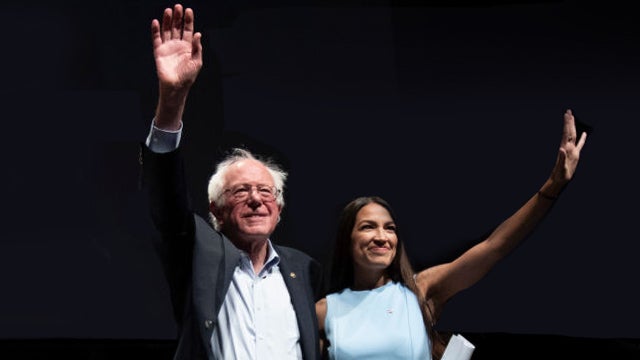
RUSH: It is. That is exact way I characterize it. And it’s crunch time now ’cause you’ve got the Democrats — I mean, in one way you could look at ’em as imploding. You’ve got Alexandria Ocasio-Cortez going and basically reviving Bernie Sanders so she’s gonna get his supporters at some point in her career. She’s nailed that down. Now you go to Iowa today and they have a poll out that Pete Buttigieg is now the guy that’s on the move in Iowa. It seems like every day or every week we get an indicator that some Democrat other than Biden is gaining ground. Where do you see the Democrat race going?
BAIER: Yeah. I do think it’s up in the air and it’s constantly changing. I think Biden’s been weakened not only by the story about Ukraine and his son, because it has to get churned around even though some in the media talk about it differently, like it’s not a problem, it still gets mentioned. I think he’s weakened by that, but then weakened by his own performance in some of these debates. And obviously he’s not giving interviews. We ask every week. So I think there’s an alternative that has to come up for the Biden lane. And whether that’s Pete Buttigieg or Amy Klobuchar or somebody who’s not in the race, Democrats I think will have to have an alternative to Elizabeth Warren and Bernie Sanders.
RUSH: Okay. Hillary Clinton says that both Jill Stein and Tulsi Gabbard are Russian agents. And she’s not backing down from it. She’s serious. I mean, to me it’s laughably humorous, but a lot of people are taking it quite seriously. Where is she in all this? Is she lurking in the shadows dying to get back into this?
BAIER: Well, it seemed like she was, but, boy, when she came out saying that, it seemed like there was a knock-back here. You know, when it’s covered, they don’t say “without any evidence.” But that’s true. “Without any evidence.” And I think what was most telling was Tulsi Gabbard’s husband putting out the picture of her in her uniform putting a flower down at a veteran’s grave, saying this is what her loyalty is. So I think that a lot of Democrats looked at that and said, “I don’t know what Secretary Clinton’s doing.”
RUSH: Twenty seconds. Do you think Trump survives all this and remains in the presidential race in 2020?
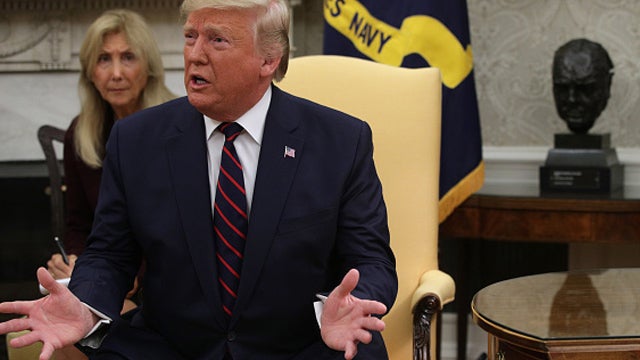
BAIER: I do, looking at everything I see right now. Everything could change. You know that change is in a heartbeat, but he has amazing resilience to beat a lot of the things that are thrown at him.
RUSH: Well, I thank you for your time, and I wish you the best. Folks, these books are really, really intriguing, all three of them are, and they do have history in them that you don’t know. And they are unique. There’s nobody that’s tackled history in this way. The latest, Three Days at the Brink: FDR’s Daring Gamble to Win World War II that basically architects the Cold War. Bret, thanks for your time.
BAIER: Thank you, Rush, as always.
RUSH: You bet. Best with the book, too, and see you soon!
BAIER: You bet.
RUSH: Bret Baier, the anchor of the Special Report with Bret Baier, 6 p.m. Eastern, the Fox News Channel.
BREAK TRANSCRIPT
RUSH: I forgot to ask Bret a question about his book. So I’m just gonna go ahead and tell you what I know. He has written a young reader edition of this book for young readers ages 9 through 14 precisely because what he thinks is the importance that young people understand history.
It really is an abomination how history is being taught today, and it’s not just public schools. The way history’s taught in private schools, colleges and so forth. It’s all been politicized to advance progressive heroes, leftist heroes in history and future leftist heroes of today and tomorrow.
But he made a point of writing a version of this that he calls the young reader edition for ages 9 to 14. He did it because he’s got sons in that age range, and he wanted them to be able to read the book now, rather than having to wait some years. So if you are interested in his book, it’s again, Three Days at the Brink: FDR’s Daring Gamble to Win World War II. It’s about the Tehran Conference, not Yalta. A lot of people don’t even know there was a Tehran Conference between Churchill and FDR and Joseph Stalin.



